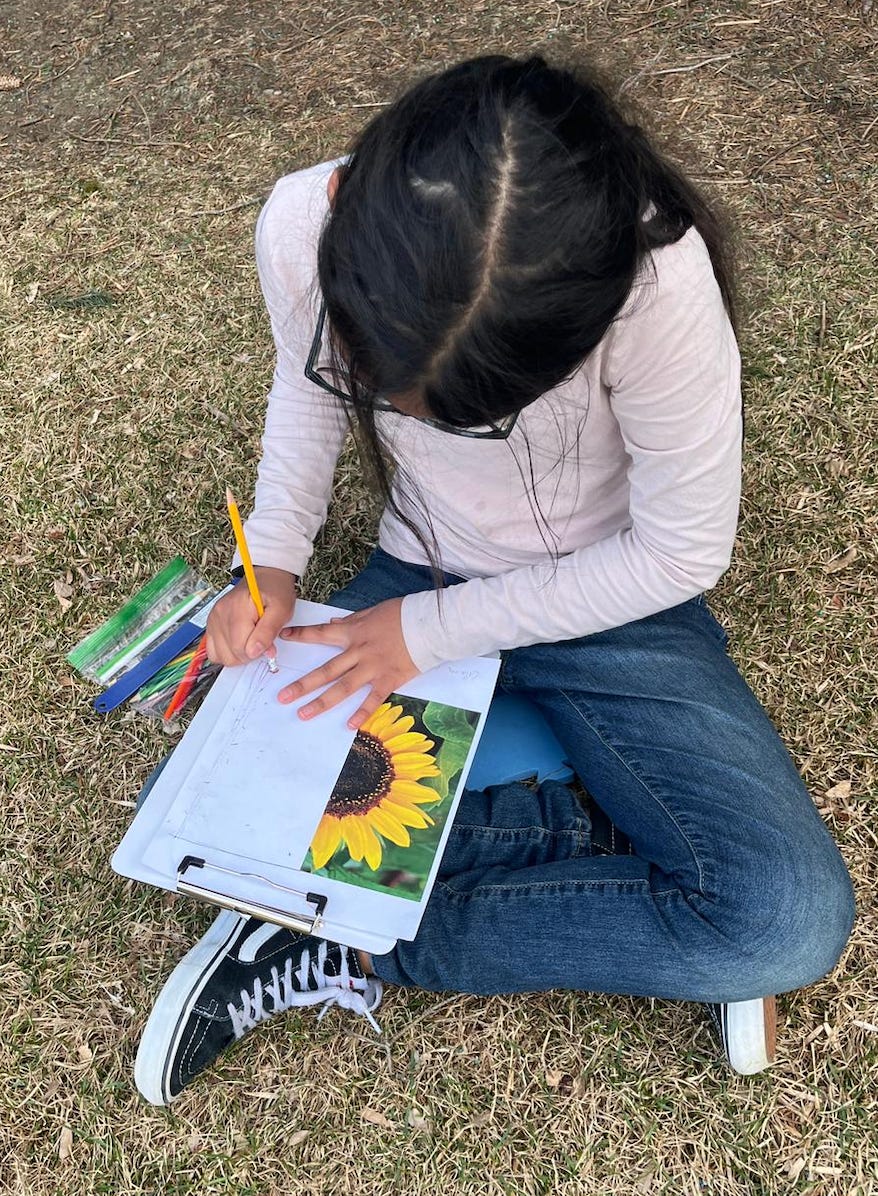TL;DR (Too long; didn’t read — by yours truly!)
One of the biggest barriers to nature-based learning is people in our schools who can’t see beyond the status quo to imagine something different — and, in the case of nature-based learning — better.
This letter is a true story of an Assistant Principal at an elementary school in Colorado who, in some perverse race-to-the-bottom, real-world dystopia has decided one of her teachers shouldn’t do outdoor nature-based learning at a nearby park because it’s “not equitable for the other 4th grade students.”
Barf.
(For newbies here - I write my posts as letters(ish) - so they generally feature a little bit about me/life before diving into nature-based learning. If you want a bit more context about why I am writing about nature-based learning, visit my Who Am I? letter.)
Dear You,
I’m glad to be finally sending this. A bit later than planned — but life has been a bit full lately. A 5-year old with pink eye, a cough, and perpetual makamasi (boogers in Kiswahili). A mysterious full-body rash and a concussion (fell off her chair!) in my just-yesterday 3 year old. Two birthdays, one crocodile themed complete with a crocodile piñata and crocodile pull-apart cake-of-cupcakes (which, incidentally, I will ALWAYS do for kids’ birthdays after seeing how much easier this is than cutting a cake and distributing slices to a frosting-crazed mob of toddlers). Anyhow. Life. You know.
How are you doing?
Unwarranted optimism?
In the realm of nature-based learning (the subject of this Learning by Nature substack) I have a question that has been haunting me. And I just have to ask,
Do you think I’m overly optimistic about nature’s benefits and their potential to drive greater health and educational equity?
Be honest with me.
I know I have a profound belief in the power of nature for our collective health and wellbeing (I’m including Mother Earth in “our” as I write this on Mother’s Day). And our salvation. Too extreme? But seriously.
Usually, I think that belief is unshakeable.
And then things like this happen that piss me off and take my breath away:
‘We’re going to have to schedule a meeting about you taking your students to learn in the park. What you’re doing is not equitable to the other 4th-grade students.’
👆🏻 This is paraphrased from something an Assistant Principal at a Colorado Elementary School said during her teacher’s annual review.
This is the face I’m making about this:

I am full judgmental llama when it comes to an Assistant Principal who is invoking equity as an argument for crappier learning for her students. Especially when she is trying to stop nature-based learning!
I CANNOT shake this one. I cannot stand by. WE CANNOT STAND BY.
The Story
Here’s the skinny: A visionary teacher-collaborator – I’ll call her “L” – has spent this whole year implementing nature-based learning with her students. From studying lines of symmetry to Wangari Maathai-inspired poetry writing and tree planting, L is making it happen. Her students are thriving, achieving, and demanding more.
L is not an average teacher. She is a master teacher with a profound investment in her students. Case in point: in March of 2020, when a little understood virus brought everything to a halt and schools pivoted to some crappy online learning without even a moment’s notice, L sought to maintain a sense of community with her students. Drawing on her love of music, her sense of humor, her lyrical skill, and a voice that allowed her to do legitimate voiceovers of well-known tunes like Elton John’s “Your Song," L composed and recorded music videos in which she sang to her students – to stay connected, to make them laugh, even to teach content. She did this EVERY. SINGLE. DAY. from March 13, 2020 until her school year ended in August. Superlative effort and her kids loved it.
Then, last fall (2022), fresh off of learning about the myriad (research-backed) benefits of nature-connected learning and feeling 🔥 fired-up (right?!), L created a vision for doing outdoor nature-based learning with her students.
In spite of being a 30-year veteran teacher, L is exactly 0% old dog.
She took the requisite steps to translate her vision to action. First, she set out to identify an outdoor classroom in a nearby – backyard – space. Her bar was not high – just an outdoor location where learning could happen. She looked at her school’s outdoor grounds. The space includes just two trees situated amidst a combo-platter of blacktop and playground. Smack in the middle of it all lies a fenced-in field of overgrown grass with a padlocked gate. She inquired, “Would it be possible to unlock that field for an outdoor classroom space?”
“No,” they said. Facilities personnel and administrators. Human padlocks on top of the actual lock. Literal gatekeepers.
Undeterred, L went for a short walk and found a park just 5-minutes walk from her school’s door. Yes!
Site ✅
The next hurdles came in the form of juggling various schedules. Lunch and recess and the normal “bell schedule.” Specialist (speech, social work) meetings for specific students. L identified a single weekly window to visit the park, ensuring her students get a dose of Vitamin N(ature - credit to
). Weekly, they clocked 105-135 minutes of nature time, meaning L and her students got most or all of the recommended 120-minute/week dose of time in nature through this recurring visit to their outdoor classroom.Schedule ✅
After the scheduling Tetris, L arranged permissions with parents/guardians. With her principal. With a small amount of grant funding, she purchased materials (foam pads to sit on, clipboards for writing) to support nature-based learning. She bought waterproof blankets with money from her own under-compensated pocket.
Permissions ✅
Supplies ✅
She got some other adults on board – a parent volunteer and a college student who could walk with her and her students. L even trained “awesome student leaders” who knew to stop periodically en route to the park to keep the group together and to “power walk to lead the group back in a timely fashion.”
Support/Group Management ✅
She figured out which lessons she could adapt to an outdoor classroom (an increasingly hard thing to do as an ever-growing percentage of curriculum requires wifi and screens). And, per usual, L planned engaging lessons – made more engaging because of being in nature – and adapted them as needed to an outdoor classroom.
Lessons ✅
As you can see, L went above and beyond to make outdoor nature-based learning happen for her students.
Even with expert planning, some weeks she was stymied. State testing. Weather not conducive to learning without more resources in the way of jackets, gloves, and hats she could not afford. Permission slips not returned.
Still, she persisted. And, more often than not, L and her students got all or close to their weekly dose of nature in school.
It was worth it.
Parents reported their kids had asked for plants 🪴 at home to put in their rooms.
They noticed their kids were ‘changed for the better’ after their park days.
Students loved it, too, asking to go out more often (*sigh* - generally not possible due to schedules).
They are wondering if – hoping – they get to go outside to learn in 5th grade.
But it’s not looking good.
Last week L had her annual review with her Assistant Principal – a woman who had come to observe her just once in the fall, indoors, in spite of L’s repeated invites to join her in the outdoor classroom.
One observation.
Months ago.
Indoors.
After a glowing review, just before leaving, L’s Assistant Principal mentioned one “step” (in the stars & steps framework - where stars are things you’ve mastered and steps are areas for growth) for L:
“We’re going to have to schedule a meeting about you taking your students to learn in the park. What you’re doing is not equitable to the other 4th-grade students, as they don’t get to go to an outdoor classroom.”
This meeting hasn’t yet happened. But let me be crystal clear here:
L’s AP is talking about equity as a giant LOWERING of the BAR. Like digging underground low. So we can achieve a new “fair” world where everyone wallows in a less healthy, less effective – crappier – status quo.
I want to let that sink in for a minute. And I’ll write you again soon.
Say “hi” to everyone for me. While you’re at it, please
Take care and abrazos fuertes,
B





A very similar thing happened to me and my Living Schoolyard class. I was not allowed to apply for grants to build and improve the program at my school because it was not “equitable” to the schools that didn’t apply for such opportunities. Basically, I was doing things on my own initiative and being successful, so that wasn’t fair.